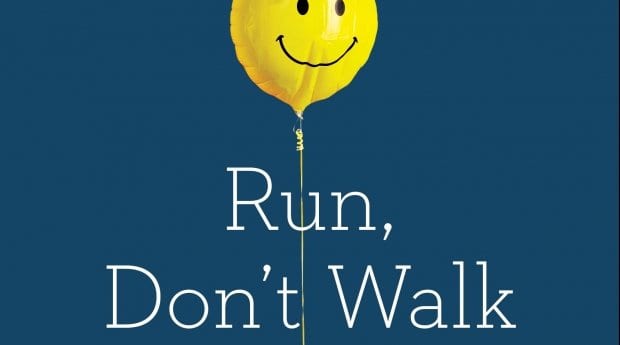It all starts with baby steps.
Baby steps, with arm-waving balance and shaky testing of foot on floor. You held on to the fingers of someone bigger and more experienced at that sort of thing, one foot in front of the other before you finally got the hang of it all.
You probably don’t remember your first steps — unless it’s your second chance to learn how to make them. In the new book Run, Don’t Walk, by physical therapist Adele Levine, you’ll see how that can happen.
The call came at 6am. Sure that someone was dead (isn’t it always the case with calls like that?), Levine answered the phone and learned she was being granted an interview for a job as a physical therapist in the amputee clinic at Walter Reed National Military Medical Center in Maryland.
Levine had studied to become a physical therapist because of “several depressing rounds of unemployment.” PT had never been her “calling” and she didn’t have big plans, other than to find a job close to her apartment. She figured that Walter Reed would be a temporary gig.
As it turned out, she loved the amputee clinic and stayed for several years.
Surrounded by glass walls, “The Fishbowl” was complete chaos, a “nonstop party” with visitors, cookies and bent rules. Double and triple amputees worked with therapists to learn to be ambulatory with new prosthetic devices, and other patients hung around as support. Because of the glass, visitors could see what went on, but Levine writes, the soldiers barely noticed. They were too busy meeting new challenges.
Sometimes, the challenges were Levine’s.
Patients occasionally didn’t cooperate with their treatment and needed warnings, encouragement or just more understanding. Others really didn’t want to get better, finding the role of victim more appealing. Like most of her co-workers, Levine tried to create unusual ways to keep everyone — staff and patients alike — occupied, to keep them working on getting better, to keep them healthy in mind and body.
They did this, though there were personality clashes. They did it, while the injured never stopped coming. And they did it, though their clinic was closing in less than a year.
Paper cuts. They’re the worst, but I promise you that you’ll never whine about trifles like that again once you’ve read Run, Don’t Walk.
With a sense of irony, a dose of humour and beaming pride, Levine gives readers entertainment and lessons that are both sweet and sad. Her anecdotes are peopled by soldiers whose lives have been forever altered, therapists who show them their lives aren’t over yet, and officers who offer support to both sides. This isn’t necessarily some sunny, feel-good book, though: Levine is plain about pain, roadside bombs, f-bombs, frustrations, injury and death.
This is one of those true stories that, when you’re done reading, you’ll wish you could read again for the first time. And how could you resist a book like that?

 Why you can trust Xtra
Why you can trust Xtra


